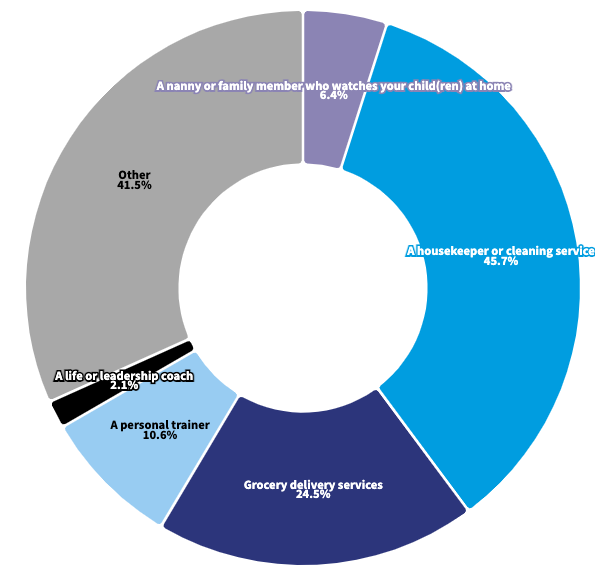COMPILED BY EMILY BARSKE WOOD, BUSINESS RECORD SPECIAL PROJECTS EDITOR
This coverage is from the Business Record’s annual survey on women’s and gender issues as part of our Fearless initiative. While nonscientific, we believe the results of this questionnaire illustrate current opinions about Iowa women’s equity in and outside of work. Read previous coverage here.
We asked those taking our gender issues survey a variety of questions about women’s equity, both in work and life.
We asked: If you live with a partner, who does the majority of the work in your house? How do you split up responsibilities?
Comments from respondents who identify as women and nonbinary:
“My husband does most of the physical labor, as I have a chronic pain condition. I do most of the mental labor. We split up responsibilities based on who has the physical and mental energy to do what and on who is experiencing the most overwhelm.”
“We split. I do laundry; he cooks. We share bedtime. We each have one night a week (sometimes more for me) that we go out with friends.”
“I do most of the work at home. Responsibilities are ‘split’ when I ask for help.”
“My husband said that since I took on the majority of responsibility for many years that he traveled for work, it was his turn to support me so that I could come home and relax.”
“Our roles are fairly equitable, but a lot of the mental load of running a house/raising a family still is mine.”
“We split up the responsibilities. I do the grocery shopping, and my husband cooks. We use a cleaning service. He mows and does all outside upkeep, and I decorate the home and plan any home improvement projects, along with budgeting. When children were little, it was a little harder; when children were sick – we tried to take turns with that, but his job seemed a little more flexible for him to take the time off.”
“Ninety-nine percent me. My husband mows the lawn.”
“My spouse and I do not have set responsibilities in our home. Some days I carry the load, and other days I don’t. We both work full time and recognize each other’s humanity that some days are better than others, and we support each other as much as we can based on our varying levels of mental and physical capacity. We also don’t strive for perfection. We prioritize time together and investing in things that bring us joy and rejuvenation over having a perfectly clean home or perfectly manicured lawn.”
“I do not live with my partner. I have a fear of being trapped with someone in stereotypical gender roles within the home.”
“My husband actually does all of the cooking and most of the cleaning at my house.”
“My husband quit his job at the age of 48 to raise our five daughters, at the time ranging in age from 2 to 12. Despite that, we continue to divide work along gender lines where I contribute more in the house and he to the outside. I take care of financial budgeting. Although, he picks up the inside slack if I am stretched at work.”
“My husband does the grocery shopping and the majority of the cooking. I am responsible for cleaning and laundry. Our children are a part of these processes. They actually take care of most of the lawn work.”
“I do slightly more than my husband. He doesn’t notice things need cleaning as much, so if I want him to help with things, I generally have to ask. I do ask, but that leaves the brain burden on me. We’re working to create more automatic systems to help with this. (For example, every other Saturday, you vacuum. It’s on the calendar so I don’t have to ask.)”
“My husband doesn’t think of the things that need done, so most of the time I have to tell him what needs done or do it myself.”
“We share fully in responsibilities based on our skill set.”
“I do the majority of the work in our house, kids, appointments, camps, child care, toy cleanup, laundry. He does lawn, snow removal, most meals and most dishes (puts them in the dishwasher).”
Comments from respondents who identify as men:
“My wife is high capacity and yet still finds time to do the majority of our housework, but she also needs a break. She loves to cook and prepare gourmet meals, so the least I can do is clean the dishes after a fabulous meal.”
“Fifty-fifty split with all items just needing to get done. No discussion of split responsibilities, although we tend to have duties we each prefer.”
“My wife is now a small-business owner, and I work for a large company, so ‘career’ time is split fairly evenly; however, she takes on the additional load of picking up the boys from school and caring for them on her own until I come home from my 9-5. Therefore, she does the majority of the ‘work’ as we define being working parents, and then we split household duties.”
“I do the majority.”
“Divided equally. Our genders have never been part of that conversation. We both do what needs to be done, usually with each person focusing on responsibilities that are strengths compared to the other.”
“Wife does all the financial work. I do all the rest.”
“We try to divide as equitably as possible. Her focus is inside, while mine is outside. We cross boundaries, though, to assist one another.”
“She does. It’s an issue we continue to work on. We have a mixed family, and the majority of the kids are hers, which skews things.”
“Sixty percent woman. Forty percent man.”
“Balanced.”
A recent Fortune magazine poll found that two-thirds of U.S. working women with at least one direct report pay for some type of hired help. In our gender issues survey we asked: Which of the following supports do you utilize? (Respondents could select all that applied.)
This question includes answers from all respondents.

A nanny or family member who watches your child(ren) at home: 6.4%
A housekeeper or cleaning service: 45.7%
Grocery delivery services: 24.5%
A personal trainer: 10.6%
A life or leadership coach: 2.13%
Other: 41.49%


